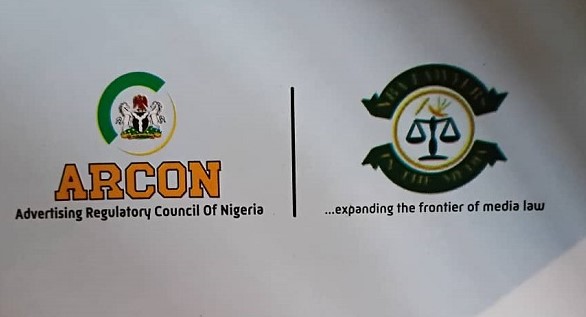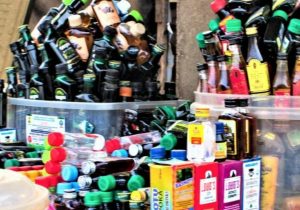
By Tunji Faleye
The advertising law scene has received a significant boost thanks to a recent collaboration between the Advertising Regulatory Council of Nigeria (ARCON) and the Nigeria Bar Association – Lawyers in the Media, who dived deep into the intricacies of Nigeria’s advertising regulatory framework in Lagos.
At a high-profile town hall meeting titled “The Nigerian Advertising Law: The Role of the Advertising Offences Tribunal,” a diverse group of lawyers, advertising professionals, industry stakeholders, and members of the public gathered to discuss the nuances of Nigerian Advertising Law and the functionality of the Advertising Offences Tribunal (AOT).
Challenges
Given the ongoing hurdles facing the AOT in handling advertising offences and offenders, this town-hall meeting was crucial. It aimed to inform media lawyers and other stakeholders about the advertising law framework and how it operates in Nigeria.
It’s worth noting that the AOT has faced challenges in the past regarding its authority to penalize advertising offences, leading to some lost cases. Many legal experts have criticized ARCON for dragging advertisers to the AOT. A notable instance was when ARCON summoned the chairman of Ambassadors College in Ogun State over an advertisement published in The Punch Newspaper on September 2, 2023.

On December 19, 2023, ARCON directed Mr. Samson Osewa, the school’s chairman, to appear before the AOT for running an advert was had not been vetted or approved by the Advertising Standards Panel (ASP). This move sparked backlash from various stakeholders, who argued that ARCON should not act as both judge and executioner.
Some parties chose not to appear before the AOT and instead sought injunctions from the Federal High Court to restrain the tribunal. Analysts suggest that these tactics are undermining the authority and effectiveness of the AOT.

The roles of AOT
According to research by PwC in 2023, Nigeria’s advertising industry is booming, valued at over ₦600 billion, with projections suggesting it could surpass ₦890 billion by 2028. This impressive growth has made advertising a key player in job creation, business innovation, and overall economic activity in the country.
Justice Cecilia Olatoregun (retd), the Chairman of the Advertising Offences Tribunal, emphasized at the event that the tribunal was established to ensure compliance, uphold ethical standards, and tackle important issues like misinformation and regulatory violations in advertising.
She pointed out that the advertising landscape in Nigeria has evolved significantly, moving beyond traditional media to embrace vast digital platforms. This shift underscores the need for a stronger, unified regulatory framework to curb excesses in the industry.
Dr. Olalekan Fadolapo, the Director-General of ARCON, shared his thoughts on how digital transformation and e-commerce have reshaped advertising practices worldwide, making stringent regulations essential. “This reality necessitates improved cross-border collaboration and compliance to protect consumers and maintain the industry’s integrity,” he stated.

Image credit: Ameachi Obiakpu
Akinlolu Kehinde, a Senior Advocate of Nigeria (SAN), highlighted the crucial roles that the AOT plays within the advertising ecosystem. He explained that the AOT has four key functions that set it apart.
He noted that the AOT offers consumers a quicker, more accessible remedy compared to traditional litigation. It promotes voluntary compliance due to its criminal jurisdiction, which serves as a stronger deterrent than civil penalties alone. This approach, he said, shifts the mindset of industry players regarding compliance.
He highlighted that with the rise of digital advertising, the AOT now has the crucial task of overseeing this new landscape. “For years, social media ads, influencer marketing, and digital content operated in a bit of a legal grey area. The AOT has put an end to that,” he noted.
“In a groundbreaking ruling in April 2025, the Federal High Court affirmed that ARCON has the authority to regulate advertising on digital platforms like social media. This ruling made it clear that the AOT’s reach covers every advert aimed at Nigerian consumers, no matter the platform or format,” he explained.
He added that by enforcing consistent standards, the AOT will help to protect legitimate businesses, as misleading advertising can skew competition and give dishonest players an unfair advantage over those who play by the rules.
Call to action
Industry stakeholders have highlighted some key strategies to build a more robust, vibrant, and efficient advertising landscape. Akinlolu Kehinde emphasizes that the Advertising Offences Tribunal needs to strengthen its partnerships with the Central Bank of Nigeria (CBN), relevant agencies, and international regulators to bridge enforcement gaps.
He also pointed out that ARCON should be equipped with digital monitoring tools and focus on public education and fostering a culture of compliance.
Lanre Adisa, the president of the Association of Advertising Agencies of Nigeria (AAAN) and chairman of the Heads of Sectoral Group, stressed the importance of finding a balance between regulation and technology to boost efficiency and creativity. He remarked, “ARCON plays a vital role in ensuring decency and compliance, but we need to figure out how to make it work in today’s world without practitioners feeling stifled.”
Adisa further emphasized the need for ongoing dialogue, collaboration, and alliances, highlighting that addressing the challenges faced by practitioners should be a top priority.
Barister Charles Odenigbo, the director general of the Centre for Media Law and Development, urged lawyers to familiarize themselves with advertising law and study the Federal High Court’s ruling in the case between Digi Bay Limited (Betway) and the Attorney General of the Federation, which affirmed AOT’s authority to determine and impose sanctions for advertising offenses.
In conclusion, stakeholders recognize that AOT is still in its early stages and may encounter resistance. They believe its success hinges on the collective efforts of lawyers, judges, policymakers, practitioners, and citizens to nurture it.
They call for cooperation to ensure that AOT lives up to its potential as a tool for consumer protection, market integrity, and national progress.
Leave your comment.


